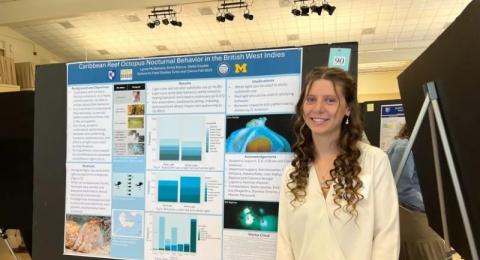Majoring in Environmental Science at UNH with a focus on ecosystems will provide you with a deep understanding of the complex interactions within natural environments, with an emphasis on the study of biodiversity, ecological processes and the impacts of human activities on ecosystems. This major, which offers a pathway to impactful careers in sustainability and conservation, appeals to students passionate about nature, wildlife and preserving the planet’s natural resources. It’s ideal for those who enjoy outdoor exploration, hands-on learning and solving complex environmental challenges.
s?
Majoring in Environmental Science at UNH with a focus on ecosystems will provide you with a deep understanding of the complex interactions within natural environments, with an emphasis on the study of ecological processes, carbon and nutrient cycling, and the impacts of human activities on ecosystems. This major, which offers a pathway to impactful careers in environmental science, management or education, appeals to students passionate about understanding how nature works, preserving the planet’s natural resources, and solving environmental problems. It’s ideal for those who enjoy outdoor exploration, hands-on learning and solving complex environmental challenges.
Why study ecosystems at UNH?
UNH is a recognized leader in environmental sciences research related to ecosystems. Students benefit from the significant depth and breadth of faculty expertise in the areas of biogeochemical cycling, environmental chemistry, ecosystem science, global change, hydrology, plant ecology, soil science and water resource management. Students have access to numerous undergraduate internships and opportunities to work in faculty research labs at an early stage. A wide range of ecosystems from mountains to the sea and all in between are available within a relatively short distance from campus for field trips and undergraduate research experiences. Students graduate with a comprehensive skill set that prepares them for work at government agencies, environmental consulting firms, and environmental and university research labs, or for continued studies in master’s and doctoral programs.
Potential career areas
- Advocacy and regulatory affairs
- Local, state and federal environmental agencies
- Education and outreach
- Environmental consulting
- Environmental monitoring
- Environmental organizations
- Research
Curriculum & Requirements
The College of Life Sciences and Agriculture (COLSA) and the College of Engineering and Physical Sciences (CEPS) jointly offer a bachelor of science degree in environmental sciences. Environmental science is an interdisciplinary field concerned with the interaction of biological, chemical, and physical processes that shape the environment, and control the response of natural systems to human activities. Students graduating with a degree in environmental sciences will have an understanding of these interacting processes, experience working in interdisciplinary teams to apply this understanding, and the ability to communicate effectively with both scientific and lay audiences. While in this program, students will acquire significant experience with field, laboratory and analytical methods appropriate for employment in professional environmental science positions as well as a basic understanding of environmental policy. The University of New Hampshire is a recognized leader in environmental sciences research, and the environmental sciences program capitalizes on faculty expertise in this area. Program faculty emphasize teaching and research in the areas of biogeochemical cycling, environmental chemistry, ecosystem science, global change, hydrology, plant ecology, soil science, and water resource management among many other fields. The Program has four options, and specific course requirements for the major vary by option. The ecosystems and soils and watersheds options are both managed by the Department of Natural Resources and the Environment in COLSA, and the geosystems and hydrology options are both managed by Earth Sciences in CEPS.
In the ecosystems option, students focus on understanding the interactions between living and non-living things in a variety of settings, including forests, fields, streams, wetlands, rivers, and lakes, including how ecosystems respond to human influence. The ability of ecosystems to withstand and mitigate environmental change is emphasized. Students will also gain a basic understanding of environmental policy, field methods and geographic information systems (GIS), and learn how to communicate effectively with many audiences.
Employment opportunities include environmental consulting firms; educational facilities (e.g., science centers), environmental monitoring laboratories (e.g., water treatment plants, the Environmental Protection Agency), government agencies (e.g., the U.S. Geological Survey, Bureau of Land Management, Natural Resource Conservation Service), university and government research laboratories, and nongovernment environmental organizations. The environmental sciences program also constitutes an excellent preparation for graduate programs in several areas relating to the environment.
Sample Degree Plan
This sample degree plan serves as a general guide; students collaborate with their academic advisor to develop a personalized degree plan to meet their academic goals and program requirements.
| First Year | ||
|---|---|---|
| Fall | Credits | |
| NR 400 | Professional Perspectives in Natural Resources | 1 |
| NR 403 | Introduction to Environmental Science | 4 |
| NR 435 | Contemporary Conservation Issues and Environmental Awareness | 4 |
| BIOL 412 | Introductory Biology: Evolution, Biodiversity and Ecology | 4 |
| ENGL 401 | First-Year Writing (or Discovery Course) | 4 |
| Credits | 17 | |
| Spring | ||
| BIOL 411 or NR 439 | Introductory Biology: Molecular and Cellular or Environmental Biology | 4 |
| MATH 424B | Calculus for Life Sciences | 4 |
| ESCI 401 or ESCI 402 or ESCI 409 | Dynamic Earth or Earth History or Geology and the Environment | 4 |
| ENGL 401 | First-Year Writing (or Discovery Course) | 4 |
| Credits | 16 | |
| Second Year | ||
| Fall | ||
| CHEM 411 | Introductory Chemistry for Life Sciences | 4 |
| ESCI 534 | Techniques in Environmental Sciences | 3 |
| NR 501 | Studio Soils | 4 |
| Discovery Course | 4 | |
| Credits | 15 | |
| Spring | ||
| NR 561 | Chemistry of the Environment | 4 |
| BIOL 528 | Applied Biostatistics I | 4 |
| NR 504 | Freshwater Resources | 4 |
| Discovery or Elective Course | 4 | |
| Credits | 16 | |
| Third Year | ||
| Fall | ||
| PHYS 401 | Introduction to Physics I | 4 |
| NR 527 or BIOL 541W | Forest Ecology or Ecology | 4 |
| Human Dimension Course | 4 | |
| Discovery or Elective Course | 4 | |
| Credits | 16 | |
| Spring | ||
| Toolkit II Course | 4 | |
| Populations/Community Ecology Course | 4 | |
| Ecosystems Course | 4 | |
| Discovery or Elective Course | 4 | |
| Credits | 16 | |
| Fourth Year | ||
| Fall | ||
| Environmental Problem Solving Course | 4 | |
| GEOG 473 | Elements of Weather | 4 |
| Elective Course | 4 | |
| Capstone | ||
| Credits | 12 | |
| Spring | ||
| Biogeochemistry Course | 4 | |
| Discovery or Elective Course | 4 | |
| Elective Course | 4 | |
| Capstone | ||
| Credits | 12 | |
| Total Credits | 120 | |
Degree Requirements
All Major, Option and Elective Requirements as indicated.
*Major GPA requirements as indicated.
Major Requirements
| Code | Title | Credits |
|---|---|---|
| Scope of the Major (Introduction - 3 Courses) | ||
| NR 400 | Professional Perspectives in Natural Resources | 1 |
| NR 403 | Introduction to Environmental Science | 4 |
| NR 435 | Contemporary Conservation Issues and Environmental Awareness | 4 |
| or NR 437 | Principles of Sustainability | |
| The Scientific Basis (Foundation - 7 Courses) | ||
| Biology I | ||
| BIOL 412 | Introductory Biology: Evolution, Biodiversity and Ecology | 4 |
| Biology II | ||
| BIOL 411 | Introductory Biology: Molecular and Cellular | 4 |
| or NR 439 | Environmental Biology | |
| Chemistry I | ||
| CHEM 403 | General Chemistry I | 4 |
| or CHEM 405 | Chemical Principles for Engineers | |
| or CHEM 411 | Introductory Chemistry for Life Sciences | |
| Chemistry II | ||
| NR 561 | Chemistry of the Environment | 4 |
| or CHEM 404 | General Chemistry II | |
| Physics | ||
| PHYS 401 | Introduction to Physics I | 4 |
| or PHYS 407 | General Physics I | |
| Calculus | ||
| MATH 424B | Calculus for Life Sciences | 4 |
| or MATH 425 | Calculus I | |
| Statistics | ||
| BIOL 528 | Applied Biostatistics I | 4 |
| or NR 525 | Statistical Methods and Applications | |
| Earth and its Systems (Core - 6 Courses) | ||
| Earth Science | ||
| ESCI 401 | Dynamic Earth | 4 |
| or ESCI 402 | Earth History | |
| or ESCI 409 | Geology and the Environment | |
| Aquatic Science | ||
| NR 504 | Freshwater Resources | 4 |
| Soils | ||
| NR 501 | Studio Soils | 4 |
| Climate/Weather | ||
| ESCI 514 | Introduction to Climate | 3-4 |
| or GEOG 473 | Elements of Weather | |
| or GEOG 670 | Climate and Society | |
| Ecology | ||
| NR 527 | Forest Ecology | 4 |
| or NR 660 | Ecology and Biogeography of New Zealand | |
| or BIOL 541W | Ecology | |
| or MEFB 530 | Evolution and Marine Diversity | |
| or MEFB 674 | Ecology and Marine Environment | |
| Human Dimensions | ||
| NR 602 | Natural Resources and Environmental Policy | 4 |
| or NR 662 | Environmental Policy, Planning and Sustainability in New Zealand | |
| or NR 507 | Introduction to our Energy System and Sustainable Energy | |
| or NR 784 | Sustainable Living - Global Perspectives | |
| or MEFB 702 | Sustainable Marine Fisheries | |
| Environmental Toolkit (Methods - 2 Courses) | ||
| Select two courses from the following: | 7-8 | |
ESCI 534 | Techniques in Environmental Sciences | |
NR 658 | Introduction to Geographic Information Systems | |
or ESCI 777 | GIS for Earth & Environmental Sciences | |
NR 757 | Remote Sensing of the Environment | |
or ESCI 778 | Remote Sensing Earth & Environmental Sciences | |
NR 713 | Quantitative Ecology | |
| Ecosystem Integration (Advanced Topics - 4 Courses) | ||
| Select four courses from the following: | 16 | |
Population and Community Ecology | ||
NR 765 | Community Ecology | |
or NR 734 | Tropical Ecology | |
or NR 706 | Soil Ecology | |
or NR 660 | Ecology and Biogeography of New Zealand | |
or NR 640 | Wildlife Population Ecology | |
or NR 642 | Introduction to Biogeography | |
or BIOL 720 | Plant-Animal Interactions | |
Ecosystems | ||
NR 730 | Terrestrial Ecosystems | |
or NR 751 | Aquatic Ecosystems | |
or NR 661 | Restoration Ecology and Ecosystem Management in New Zealand | |
or MEFB 508 | Marine Ecosystem Research and Management | |
Biogeochemistry | ||
NR 744 | Biogeochemistry | |
or NR 761 | Environmental Soil Chemistry | |
or NR 703 | Watershed Water Quality Management | |
or ESCI 642 | Biogeosciences in the Earth System | |
Environmental Problem Solving | ||
ESCI 654 | Fate and Transport in the Environment | |
or NR 707 | Environmental Modeling | |
or NR 749 | Forest Inventory and Modeling | |
or NR 743 | Addressing Arctic Challenges | |
or NR 731 | Agriculture and Environmental Change: Challenges and Solutions | |
| Integration and Research (The Capstone Experience) 1 | ||
| Capstone: | ||
NR 663 | Applied Directed Research in New Zealand | |
or NR 795 | Investigations | |
or NR 799 | Honors Senior Thesis | |
| Total Credits | 83-85 | |
Capstone Experience
NR 663 Applied Directed Research in New Zealand (EcoQuest if Senior Year), or NR 795 Investigations, or NR 799 Honors Senior Thesis, or approved research experience, or approved internship. Every student must complete a capstone experience senior year, or during the summer before senior year, if at least 90 credit hours have been completed.
1) A contract form provided by the program must be completed and signed by the student, the advisor, the program coordinator, and the capstone mentor (faculty or off-campus) before the capstone experience, by the end of the junior year.
2) A signed Capstone Experience Evaluation form must be submitted to your advisor by the end of the senior year in order to graduate.
Preparation for Capstone: Please discuss with your faculty advisor regularly what kind of capstone experience you would like to pursue. If you remain uncertain during the junior year, the Earth Science department offers a Capstone Preparation course, ESCI 796 Topics in the spring, but this is not required.
Individualizing Your Education (Electives)
One goal of this program is to allow students the opportunity to pursue minors, dual majors, research and study abroad opportunities, while still completing the degree in four years of full-time enrollment. To this end, the program requires a total of 85 credit hours. The University Discovery program includes 5 areas (20 credit hours) not covered by this major. These include English 401, Fine and Performing Arts, Humanities, Historical Perspectives, World Cultures (NOTE: The World Cultures category can be met by certain study abroad programs, including EcoQuest). Combined, Major and Discovery requirements total 105 credit hours. With a total of 128 credit hours required by the University for graduation, this leaves 23 credit hours that can be put towards minors, dual majors, study abroad, Directed Research, etc.
- 1
Many students enroll in the EcoQuest program (a study abroad opportunity in New Zealand), which satisfies the policy requirement, and capstone requirement if taken senior year.
Program Learning Outcomes
Key Learning Objectives:
- The primary Learning Outcome for the Environmental Science Program will be that students will master the content offered in the courses specified in the curriculum as assessed by performance on exams, labs and written assignments. This will include an understanding of the physical, chemical and biological processes central to the function of environmental systems, the mathematical concepts required to understand, explain and predict those processes, and the ability to determine the significance of results, both in terms of statistical probability and impact on the larger world.
The learning process leading to this mastery will require that students will have:
- Knowledge of how physical, chemical, and biological factors interact with human activities to shape the environment;
- Proficiency with environmental techniques including field, lab, GIS, or modeling;
- The ability to solve environmental problems;
- The ability to communicate orally or in writing about environmental dynamics.
Explore Program Details
Key Learning Objectives:
The primary Learning Outcome for the Environmental Science Program will be that students will master the content offered in the courses specified in the curriculum as assessed by performance on exams, labs and written assignments. This will include an understanding of the physical, chemical and biological processes central to the function of environmental systems, the mathematical concepts required to understand, explain and predict those processes, and the ability to determine the significance of results, both in terms of statistical probability and impact on the larger world.
The learning process leading to this mastery will require that students can:
- Evaluate the quality of information sources and the validity of scientific theories and data presented in those sources
- Describe and explain the interactions among physical, biological, chemical, and human components of the environment, especially in terms of feedbacks embedded in environmental system that often control their trajectory
- Formulate tests of environmental questions, acquire data, and apply scientific methods to answer these questions;
- Establish protocols for collecting, transcribing, storing and analyzing data collected during field, laboratory or modeling experiments
- Master mathematical, statistical, and study design knowledge and skills, and use state-of-the-art software, hardware, and analytical techniques relevant to environmental conservation and sustainability:
- Communicate effectively to peers within the environmental community and with audiences outside of the discipline.
The Environmental Science program at UNH is geared towards teaching students how to understand how various types of ecosystems work, how people are influencing these ecosystems, and how to solve major environmental problems of the day. Students are trained by professors who are internationally recognized for their research in forests, soils, streams, agroecosystems, urban ecosystems and watersheds, using cutting edge technologies. UNH is ideally located near mountains, coasts, fields, and cities, offering opportunities to visit and work in forests, streams, rivers, lakes, estuaries, agroecosystems, and urban ecosystems. We emphasize interdisciplinarity, not just within the environmental science major but across other study areas, including geology, climate, policy, environmental engineering, spatial science, and social science. Such interdisciplinarity is critical for solving problems and for achieving sustainability.
There are four career paths that most of our majors move along once they graduate with an Environmental Science degree: consulting firms, government agencies from local to the federal level, non-profit organizations, and graduate school. Recent graduates have gotten jobs with New Hampshire Department of Environmental Services, the US Geological Survey, Triumvirate Environmental, Normandeau Associates, the National Ecological Observing Network, City of Portsmouth Public Works Department, the Appalachian Mountain Club, AECOM, Loureiro Engineering Associates, and Energy Source LLC, among others. Examples of where are students recently attended graduate school include the University of North Carolina, Northern Arizona State University, University of Massachusetts Amherst, the University of Colorado, Utah State University, the University of Nebraska, Colorado State University, and UNH.
We have between 70 and 80 total majors in any given year, with seven core faculty.
Once you reach the core environmental science courses during junior and senior year, typical class sizes are about 20 students. These include labs that take you outside, mostly led by the faculty themselves. Early introductory environmental science courses during freshman year tend to be larger, but are still mostly less than 50 students.
Often! We have ready access to ecosystems on campus (College Woods, Oyster River, College Brook), just off campus (e.g., forest and fields at Thompson Farm, the UNH Organic Dairy, Lamprey River, Great Bay Estuary) and around the state for field trips (e.g., Hubbard Brook and Bartlett Experimental Forest in the White Mountains, Plum Island Wildlife Refuge, and Harvard Forest in Massachusetts). Courses emphasize field experiences, including measurements, experiments, monitoring, and independent research projects.
Yes! Each of our faculty works closely with undergraduates both in terms of academics and research. Each student is assigned a faculty advisor who helps guide the student through their academic program based on their career and subject interests. Students typically have the same advisor for all four years of their program. Faculty often hire undergraduates initially to work in their labs to help out on research projects. Many undergraduates eventually conduct independent research projects that they lead themselves in collaboration with their faculty mentor. They then have the opportunity to present their research findings at our annual Undergraduate Research Conference. Many undergraduates also participate directly in the faculty’s weekly lab meetings.
Our department hosts one of the premier Study Abroad Programs at UNH, which also attracts students from other universities around the country: the EcoQuest program in New Zealand. You have a choice of going to study the environment of New Zealand during Spring, Summer, or Fall semesters. The academic program is completely integrated into the major, so a semester abroad checks off a semester worth of environmental science classes.
Yes! We encourage students to reach out to faculty in their field of interest as soon as they get to campus. First-year students take NR 400 (Perspectives in Environmental Science) in the Fall as soon as they get on campus to learn directly from faculty about their research. Students can learn about research areas that interest them most and are encouraged to reach out to those faculty members.
Many of our faculty have externally funded research, which includes funds to support undergraduates to help with research. So yes, funding is often available to pay students to work in labs and to conduct research. The University also has a program (the Undergraduate Research Opportunities Program) that supports student research by providing a stipend and funds to cover research costs. Students can apply to do work in a lab on campus or to conduct independent field research around the U.S. or internationally.
UNH has a number of paid summer or semester research fellowships through the Hamel Center for Undergraduate research. These provide stipends, as well as supply funding, that supports undergraduates to conduct research over a ten-week period. These are competitively awarded based on a proposal, often written in collaboration with faculty, postdoctoral researcher, or graduate student mentors. Our faculty also obtain Research Experience for Undergraduates (REU) fellowships from the National Science Foundation on research projects. Because faculty are also part of wider national and international research networks such as the Long Term Ecological Research network, National Estuarine Research Reserve program, Critical Zone Observation network, and National Ecological Observing Network, they are often made aware of and write recommendations for internship opportunities available in ecosystems around the world, ranging from the tropics to the arctic, and everywhere in between.
Professors are generally available to meet with any student regarding courses, research, or career questions at least by appointment, and many have open-door policies. Students doing research in a professor's lab are encouraged to participate in weekly lab meetings.
The Environmental Science major provides an unusual level of flexibility because of the number of free credits that it makes available to students. After taking the required general (Discovery Program) and major (Environmental Science) courses, there are between 19 and 23 free credits (depending on whether you are in the Ecosystems or Soil and Watersheds option). This provides a lot of flexibility for a minor (typically 20 credits) or to achieve a double or dual major. Our philosophy in making these credits available is that Environmental Science is inherently interdisciplinary, interacting with the economy, politics, society, journalism, or the arts. The ability to work with and integrate these other fields can, therefore, be very helpful if not critical.
Rigorous academic pursuit and hands-on learning from the mountains to the sea. Full immersion learning at a diversity of sites in the North and South Islands.
Xi Sigma Pi is facilitated through the UNH NREN department. Its goal is to unite likeminded individuals through service and fraternal spirit through a shared enjoyment of the environment. In addition, members receive recognition for their service by earning a cord to wear during graduation. Opportunities to take up leadership roles and give back to the NREN department are abundant.
Students interested in the Environmental Sciences: Ecosystems major may also be interested in the following advanced degrees at UNH. Students in the program also have the opportunity to participate in the UNH accelerated master’s program.
Natural Resources and the Environment M.S.
Natural Resources: Ecosystem Science M.S.
Natural Resources: Environmental Conservation and Sustainability M.S.
Natural Resources: Environmental Economics M.S.
Natural Resources: Forestry M.S.
Natural Resources: Wildlife and Conservation Biology M.S.
Earth Sciences: Geochemical Systems M.S.
Earth Sciences: Ocean Mapping M.S.
Geospatial Science Graduate Certificate
Ocean Engineering: Ocean Mapping M.S.
















